The Sugar Mile
Glyn Maxwell Interview
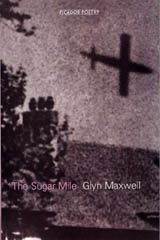 Your latest book of poetry, The Sugar Mile, is a narrative based over a couple of days, just before 11 September 2001.
Your latest book of poetry, The Sugar Mile, is a narrative based over a couple of days, just before 11 September 2001.
It’s three days. The frame is three different days in which I show up at this pub on Broadway and I’m told this story by this old guy, and that’s the frame. It’s the weekend before 9/11, so it’s a very beautiful weekend, it’s great weather. And no one knows what’s going on. But the old guy’s story takes place in September 1940. The dates oddly coincide – it was ten days into September in both cases.
Was there any actual historical event during the London Blitz that you picked on? I was thinking about the bombing of the Tate & Lyle factory which you mention – or was that fictional?
No, no, it’s absolutely true – that’s all researched, that’s all true. This school was bombed – it was the worst civilian loss of life during the war in Britain. The first day of the Blitz was Black Saturday, September the seventh 1940, and bombs rained down on the docks. The Tate & Lyle factory was there because it was near the docks, and the docks were the real target for Hitler. It was the first daylight raid, so it was very frightening apart from anything else. And bombs just rained down en mass on the docklands. So the family that I have, whose father works for Tate & Lyle, their house is bombed and they’re evacuated to this school – and this is all perfectly true – and it held about
… reports differ, but hundreds of people were sheltering there, and they were going to be evacuated by London buses to the countryside, and the London buses got lost, they got their Camden Town mixed up with their Canning Town and got lost and they never came, and they came just too late. These people were there two nights – two days and two nights – sheltering in the school, and in the small hours of the second day, which is September the tenth, it took a direct hit, and they still argue in the East End about how many died, but the official figure was about seventy five, and the unofficial figure is something like five hundred. The school was completely destroyed – it’s just a shell you see in pictures of it – there couldn’t have been many survivors, and it was concreted over and limed over so no one knows how many really died, and we’ll never know. But it was obviously a lot.
The poems jump between different sorts of narrative voices and go backwards and forwards in time between events in New York in September 2001 and in London during the Blitz at the equivalent moment.
That’s right. The peculiar sort of innocence just before
… I suppose I’m looking at what that was like in New York, 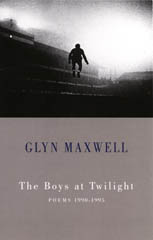 refracting that with our historical knowledge of what that was like in London. It was just something of a lark, the beginning of the war in London, the ‘Phoney War’, which in the book is called the ‘Bore War’, because it was called that in real life, too. It was just like, ‘What’s all this fuss about? Why are we learning about gas masks? We don’t need any of this.’ So it’s trying to capture that. It’s funny, when I first read poems from this book, I read with this terrific German poet. He’s from Dresden, so he has work that’s got one of the worst civilian bombings of the war behind it as well, so we’re looking at
refracting that with our historical knowledge of what that was like in London. It was just something of a lark, the beginning of the war in London, the ‘Phoney War’, which in the book is called the ‘Bore War’, because it was called that in real life, too. It was just like, ‘What’s all this fuss about? Why are we learning about gas masks? We don’t need any of this.’ So it’s trying to capture that. It’s funny, when I first read poems from this book, I read with this terrific German poet. He’s from Dresden, so he has work that’s got one of the worst civilian bombings of the war behind it as well, so we’re looking at
… at the time London gets bombed it’s all about, ‘How dare Hitler do that? How dare he bomb civilians in daylight? What are we going to do in response?’ This was not cricket, to do this. And by the time you get to Dresden it’s five years later and it’s absolutely no holds barred.
I’m interested in the notion of the way movements, sudden cataclysms of history, intersect with personal lives, and that seems to be what you’re dealing with in this book.
I suppose I’m just trying to voice the people who are buried in these catastrophes, and give them
… I think that’s why I’m using quite strong traditional forms on the whole, I’m giving them more different traditional forms, but those forms are memorable forms, I want their voices to be memorable, as if they were photographs, framed photographs.
What do you mean by traditional forms?
Some of them speak in quatrains, and some of them rhyme, and some speak in sestinas, and so on. I’ve chosen specific forms that seem to go with certain people, to give them a profile. I want to hear the human voices. There seems to be such a high level of violence, and it seems to have got so close to civilians now, in the two places I spend time in – New York and London – that I think it’s too soon for any kind of measured response. This is a response about: ‘Let’s just speak some of the voices of what gets destroyed in this.’
I was always very struck by a picture I saw in an exhibition about Anne Frank, which showed the living room of the Frank family before they had to go into hiding, and everything about it was redolent of security, they had the aspidistra, the beautiful piano, the curtains were heavy-hangings, there was lovely wallpaper, everything felt sort of secure, it just spoke security. It burned itself into my mind that all of that was dismantled with the click of a finger.
That’s right. I did a lot of reading for this, a lot of research. The best research I did was to spend a few hours in the Imperial War Museum and just wander around the Forties House – you know that BBC thing? That house is still standing inside the Imperial War Museum, and it’s full of all the little details of children growing up in the late 30s and early 40s, and what they would’ve been reading, and I fed a lot of that into it, it’s so poignant, and so evocative, I felt I really wanted to build these people up from those details.
You fed in all sorts of details, phrases that were almost clichés of the time, rather like Eliot’s Prufrock technique, with snatches of voices and so forth.
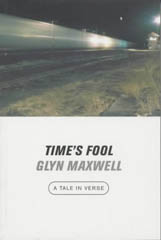 That’s one of the few things that I suppose is some kind of ancestor of this book. It’s those little bits in Eliot where voices come through. In ‘The Wasteland’ you have those pub regulars, although I think Eliot was a little condescending about them.
That’s one of the few things that I suppose is some kind of ancestor of this book. It’s those little bits in Eliot where voices come through. In ‘The Wasteland’ you have those pub regulars, although I think Eliot was a little condescending about them.
Another aspect of the poems I found quite interesting is that measure of distance that – let’s say ‘the writer’ – in his personal life might place between himself and the rest of the world. Do you ever escape from being the writer, or are you always beachcombing orally?
I suppose one does feel a bit of an outsider. That’s the central contradiction about being a poet at all – on the one point, you’re supposed to be speaking representatively in some way, and saying things that are universal; on the other hand, because you’ve chosen to be that, you are doing something very unusual and you’ve carved out some sort of lonely space that most people don’t inhabit. I suppose The Sugar Mile is a self-portrait, in that it’s a self-portrait of somebody who doesn’t know what his voice is, and would rather speak in other people’s voices. I’d rather make characters and make stories out of characters. So in a way, it’s an answer to a kind of writer’s block. That’s why I begin the book and I’m interrupted and I end the book, and that poem’s abandoned. I don’t want to hear my voice – I don’t know what my voice is – I don’t know why it would have the presumption to say anything. But if I can make a story out of other voices, I feel that’s my way out of a hole.
It’s almost like a collage technique. It’s possibly also a sort of absence of commitment. I don’t mean that rudely, but – is there a commitment in this book?
No, I think the commitment in this book is sort of formal. I have a problem with most contemporary poetry because I have a problem with its presumption.
Do you mean its presumption that things can be done without complying to the forms?
In most cases, why should we listen to this voice saying things this way? I don’t want to listen to a voice – I don’t believe in a voice – unless I feel something like a human profile to it, I feel the breath in it, I feel the bloodstream in it, I feel the footsteps in it, I feel an awareness of what it’s like to actually live in the body, and with most poetry I don’t get that. Most poetry seems to me too cerebral, and isn’t committed to the physical in that way. I think a lot of that’s connected in my mind with how people have thrown out form. In America certainly there’s a total rejection of form, and I’m not sure to what purpose that’s happened.
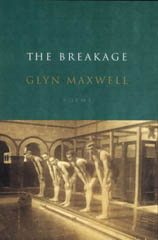 Tell me, what do you think are the particular illuminations or freedoms that these forms allow? Is there any particular form that makes you feel, ‘Oh, hey, I’ve done this this way because I’m using this form and it’s actually drawn me into a particular expression of ideas’?
Tell me, what do you think are the particular illuminations or freedoms that these forms allow? Is there any particular form that makes you feel, ‘Oh, hey, I’ve done this this way because I’m using this form and it’s actually drawn me into a particular expression of ideas’?
I think it works like that with all of them. The old guy speaks in very loose couplets, in which he’s often repeating the same word – rather than rhyming it, he’s actually repeating it – and
… It’s not to do with authenticity of ideas, because I want these to come from people. It isn’t a synthesis, it’s no kind of intellectual synthesis, it’s trying to make accurate pictures of people, so that sort of couplet form where the word is often the same word repeated seems to go well with an old man, the sestina seems to go well with a barman, the traditional quatrains go well with the sort of ‘stiff upper lip’ elder son, and then the sort of free verse goes better with the other son, and then very lyrical things go with the daughter. I can make a certain kind of profile out of certain forms left lying around, so it’s an exploration in that way. It’s not committed in the sense that a play
… well, the plays I write aren’t committed, in that if I was committed to certain points of view and wanted to advance them at the expense of other points of view, I think I’d probably be in a different profession. I feel ambivalent and contradictory about most things – not all things, but most things. Even quite extreme views, I can really see the other point of view, and as a playwright I should be able to articulate all the points of view; one should be able to articulate points of view that are quite extremely far from one’s own. So, in a way I’m starting to feel that maybe biologically I’m a playwright, and I’ve been thinking I’m a poet all this time – and having a lot of fun along the way.
But I don’t think that that’s a very great leap. My only, rather small, experience of trying to write plays – of anything for theatre – was when I went to some workshops in the Traverse, run by various people, and it was very, very interesting to me, because my realisation was how close a play – any play, almost – is to poetry, because it’s condensed. And the thing the actors were always saying in these workshops was, ‘Where is it going, where is it going?’
I absolutely agree. Poetry could learn a lot from actors. I have such a good time working with actors, because this is the stuff that you write in your head and you’re testing it through the lungs and the body of people. It’s really a test that poetry has to pass, and most poetry isn’t exposed to. It doesn’t take that test. And I’m lucky enough to now be dealing with this all the time, and I was just seeing my show in there and thinking, ‘This bit’s horrible. We need to do this again.’
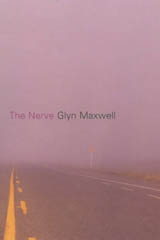 To go back to your poems, did you really sit talking to strangers in a bar just before the 9/11 thing?
To go back to your poems, did you really sit talking to strangers in a bar just before the 9/11 thing?
No. I wasn’t living in New York then; I was living in Massachusetts. I’d been down to New York a lot, and I knew people who were quite close to it, and my wife new people who were killed in it. But no, I was imagining it, the encounter in the pub didn’t happen. The historical details from the war are true, but the framework is invented. Although I do spend an awful lot of time sitting in bars listening to people…
The Sugar Mile by Glyn Maxwell is published by Picador (ISBN 0330438247 PBK £8.99).
© Jennie Renton 2005

Comments